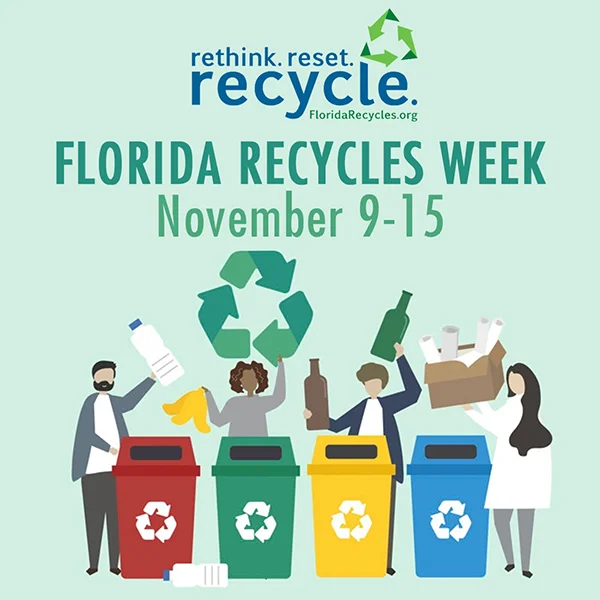Participate in 'Florida Recycles Week', and Carry On Good Habits For The Rest of The Year!
 This week, November 9-15th is 'Florida Recycles Week' and leads up to America Recycles Day on Sunday, November 15th. To celebrate, here are some tips & reminders you and your family can do to help do our part to reduce waste.
This week, November 9-15th is 'Florida Recycles Week' and leads up to America Recycles Day on Sunday, November 15th. To celebrate, here are some tips & reminders you and your family can do to help do our part to reduce waste.
1. Reduce and Reuse
While it may not seem like part of recycling, reducing the amount of materials you use and reusing items instead of tossing them can prevent waste before it starts! Chose items wrapped in paper instead of plastic, use refillable water bottles, and bring reusable bags to the grocery store.
2. Know What Can Be Recycled Curbside
It is easy to overlook items that can be recycled or to get confused as to which goes where. The Town of Jupiter provides a blue bin and a yellow bin to every residence. For recycling bins, call 866-NEW-BINS, and the Solid Waste Authority will bring some to you! Here’s what goes where!
Blue Bin:
Plastic bottles and containers (lids on, 2 gallons or less)
Aluminum cans
Glass bottles and jars (lids off)
Milk and Juice cartons (lids on)
Drink boxes (no pouches)
(Plastic bags can be recycled at Publix in the green bins in their front lobby!)
Yellow Bin:
Cardboard (cut, flattened, and 36” x 36” or less)
Newspaper and inserts
Office and School Paper
Magazines
Dry Food Boxes
Paper bags
Cardboard paper rolls
Pizza boxes
3. Have a Bin in Every Room
Ask the majority of recycling families where their bins are and you will likely receive a resounding collective of “in the kitchen”. Unfortunately, many of the other rooms become neglected, allowing perfectly recyclable materials to end up in trash cans.
Place a bin in the bathroom to collect cardboard toilet paper rolls, empty product containers, pill bottles, and packaging. In the office or craft room, you can collect printer paper, bottles, old files, pamphlets, and flyers. The bedroom provides, amongst other items, product containers, to-do lists, and magazines.
Do not forget the garage where you not only have items such as jars, bottles, and project waste, but items that come with you out of the car once you have parked such as glass bottles and cans.
4. Recycle Old Appliances & Tech Products
With the massive amounts of technology in the world today, the landfills are brimming with defunct computer systems, cellular phones, televisions, printers, and more. Instead of ditching your obsolete tech toys into the trash can, call your local electronics store to see whether they provide a recycling option.
Many electronics stores will actually take back certain items and provide a credit, or can put you in touch with companies to assist you. The manufacturer of many products also accepts unwanted items that can be refurbished or used for parts.
For many old appliances, it may be dangerous to simply discard in the trash. This is especially important for fridges and freezers that were manufactured before 1995, as they may have a type of insulation (CFC-11) that can be destructive to the environment. To help you dispose of these appliances in a safe manner, the EPA has created the Responsible Appliance Disposal (RAD) program. Please visit this page on their site to find a RAD partner in your state.
5. Recycle Water
Before you let your used water swirl down the drain, find ways to recycle it in and around your home. You can go as simple as pouring the water from cooking pasta directly into a flower bed, or you can make changes to your plumbing to allow you to utilize greywater.
Greywater is the water throughout your home that has been used for a single purpose such as bathing, cleaning dishes or washing clothing. This water can be recycled to support your lawn and garden, keeping your landscape fresh and green in a less wasteful manner.
6. Recycle Food
Recycling food is more commonly referred to as composting, but it is still a form of the process, nonetheless. Organic matter is the greatest source of methane emissions and, unfortunately, landfills are bursting with it.
According to the United Nations Environment Programme, an average of nearly 20 pounds of food is wasted each month per person, helping to make organic waste the second largest component found in landfills.
Composting at home can be done in a do-it-yourself bin, or one purchased for indoor or outdoor use. If you have a large amount of food waste, though, check with your city to see whether you have the option of curbside pick-up specifically for organic waste. Commercial compost facilities usually accept plant-based goods, dairy items, and meat. If you are composting in or near your home, you might want to stick with plant-based items in order to reduce the smell and avoid attracting animals to your yard.
7. Buy Recycled
If you are recycling to minimize your carbon footprint, it makes sense to use the same principles when purchasing new items.
When you buy items made from recycled materials you are using your dollars to vote for greener business practices, letting companies know that products made in an eco-friendly manner matter to you. In addition, items that are made from recycled goods are likely to be recyclable again once you are finished using them.



Leave A Comment